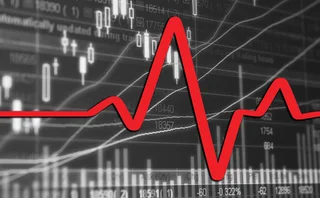
Credit derivatives to hit $33 trillion by 2008, says BBA
The global market for credit derivatives is expected to reach $33 trillion by the end of 2008, according to a British Bankers’ Association (BBA) report released at its credit derivatives conference last week.
The main players in the credit derivatives market remain hedge funds and banks. Hedge funds have doubled their share of the market in selling credit protection, from 15% in 2004 to 32% in 2006, reflecting their stature as a growing force in the market. They have similarly expanded their share as buyers of credit protection, from 16% in 2004 to 28% in 2006. This growth has eclipsed that of the banks, but a stabilisation is expected over the next two years, with hedge funds predicted to account for 30% of both sides of the market by 2008.
Banks still hold the greater part of the market participation in buying and selling credit protection, but their market share has dropped from 67% of buying in 2004 to 59% in 2006, and 54% of selling in 2004 to 44% in 2006, showing a slower growth rate than the hedge funds. Hedge funds have supplanted insurance companies as the second largest sellers of credit protection. Insurance companies as a whole represent 17% of sellers in 2006, down from 20% in 2004 and 33% in 2002.
The growth in market size has been matched by an expanding variety of products on offer and shifts in product use. Innovations in full index trades have proved popular, growing from 9% of the market share in 2004 to the second most used in 2006, with 30% of the market share, overtaking synthetic CDOs, which represent 16%. Single-name credit default swaps have lost market share for the first time, down to 33% in 2006 from a high of 51% in 2004.
Ross Barrett, wholesale director of the BBA, said index trades have expanded so rapidly “because they offer more flexibility in tailoring them to what clients want, such as in terms of the performance of an index or equity, whereas single-named CDSs are more vanilla now.” Barrett said alternative products, such as recovery swaps, could gain ground over the next two years.
London remains one of the world’s dominant centres for trading credit derivatives, holding just under 40% of global market share, and is estimated to trade over $7 trillion by the end of 2006 and over $10 trillion by the end of 2008.
The BBA’s bi-annual survey is based on the responses of market leaders in credit derivatives.
Only users who have a paid subscription or are part of a corporate subscription are able to print or copy content.
To access these options, along with all other subscription benefits, please contact info@risk.net or view our subscription options here: http://subscriptions.risk.net/subscribe
You are currently unable to print this content. Please contact info@risk.net to find out more.
You are currently unable to copy this content. Please contact info@risk.net to find out more.
Copyright Infopro Digital Limited. All rights reserved.
As outlined in our terms and conditions, https://www.infopro-digital.com/terms-and-conditions/subscriptions/ (point 2.4), printing is limited to a single copy.
If you would like to purchase additional rights please email info@risk.net
Copyright Infopro Digital Limited. All rights reserved.
You may share this content using our article tools. As outlined in our terms and conditions, https://www.infopro-digital.com/terms-and-conditions/subscriptions/ (clause 2.4), an Authorised User may only make one copy of the materials for their own personal use. You must also comply with the restrictions in clause 2.5.
If you would like to purchase additional rights please email info@risk.net
More on Credit markets
Liquidnet sees electronic future for grey bond trading
TP Icap’s grey market bond trading unit has more than doubled transactions in the first quarter of 2024
Single-name CDS trading bounces back
Volumes are up as Covid-driven support fuels opportunity for traders and investors
Podcast: Richard Martin on improving credit migration models
Star quant proposes a new model for predicting changes in bond ratings
CME to pass on Ice CDS administration charges
Clearing house to hike CDS index trade fees from July after Ice’s determinations committee takeover
Buy side fuels boom in single-name CDS clearing
Ice single-name CDS volumes double year on year following switch to semi-annual rolls
Ice to clear single-name bank CDSs from April 10
US participants will be able to start clearing CDSs referencing Ice clearing members
iHeart CDS saga sparks debate over credit rules
Trigger decision highlights product's weaknesses, warns Milbank’s Williams
TLAC-driven CDS index change tipped for September
UK and Swiss bank Holdco CDSs likely inclusions in next iTraxx index roll, say strategists







